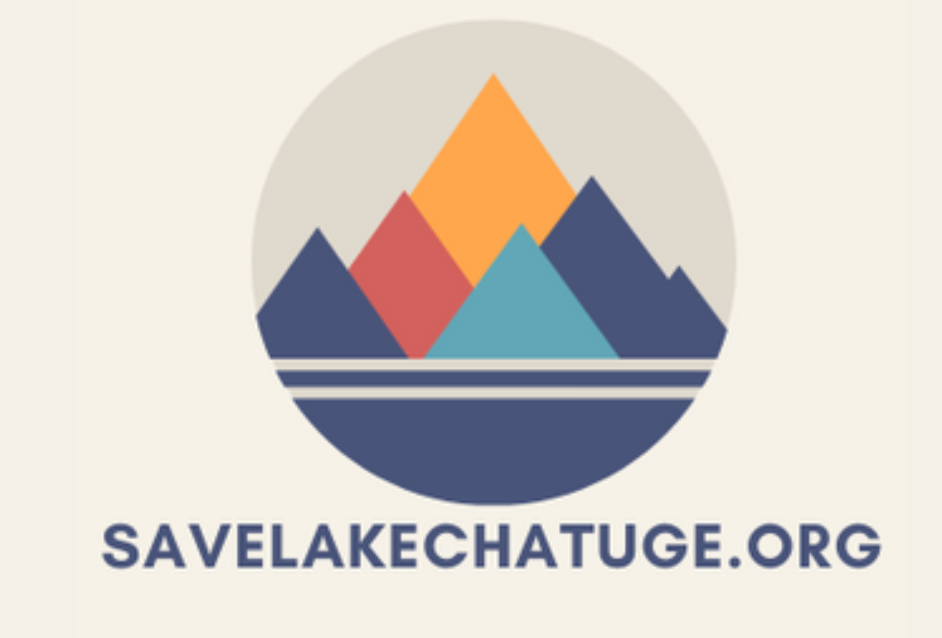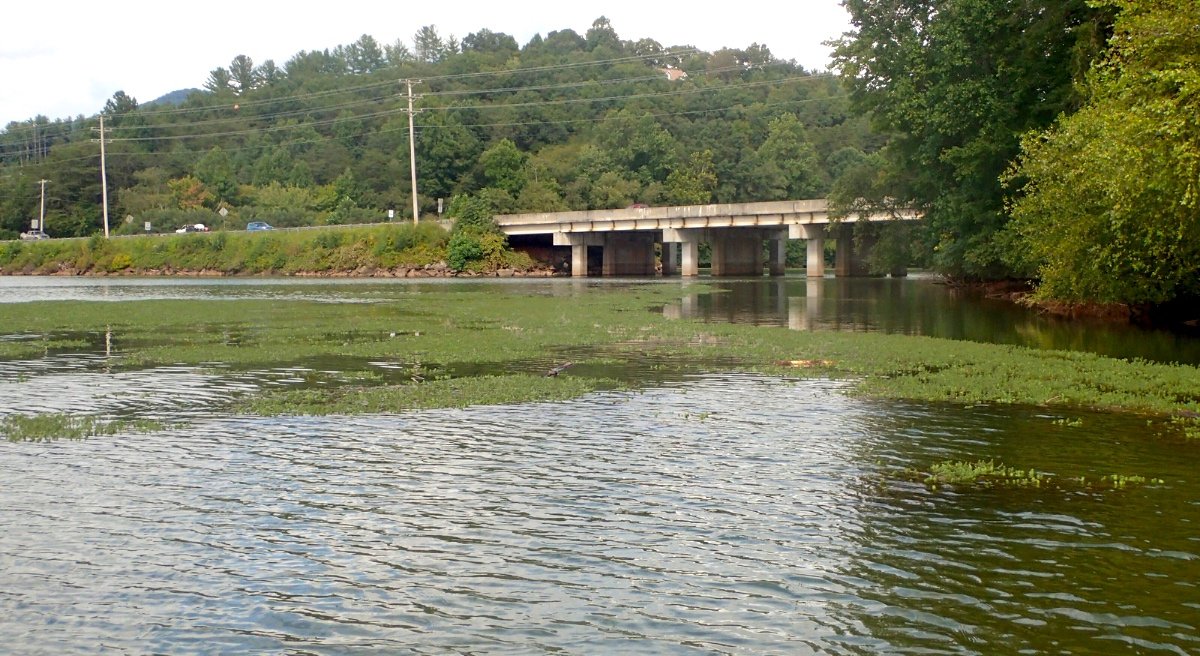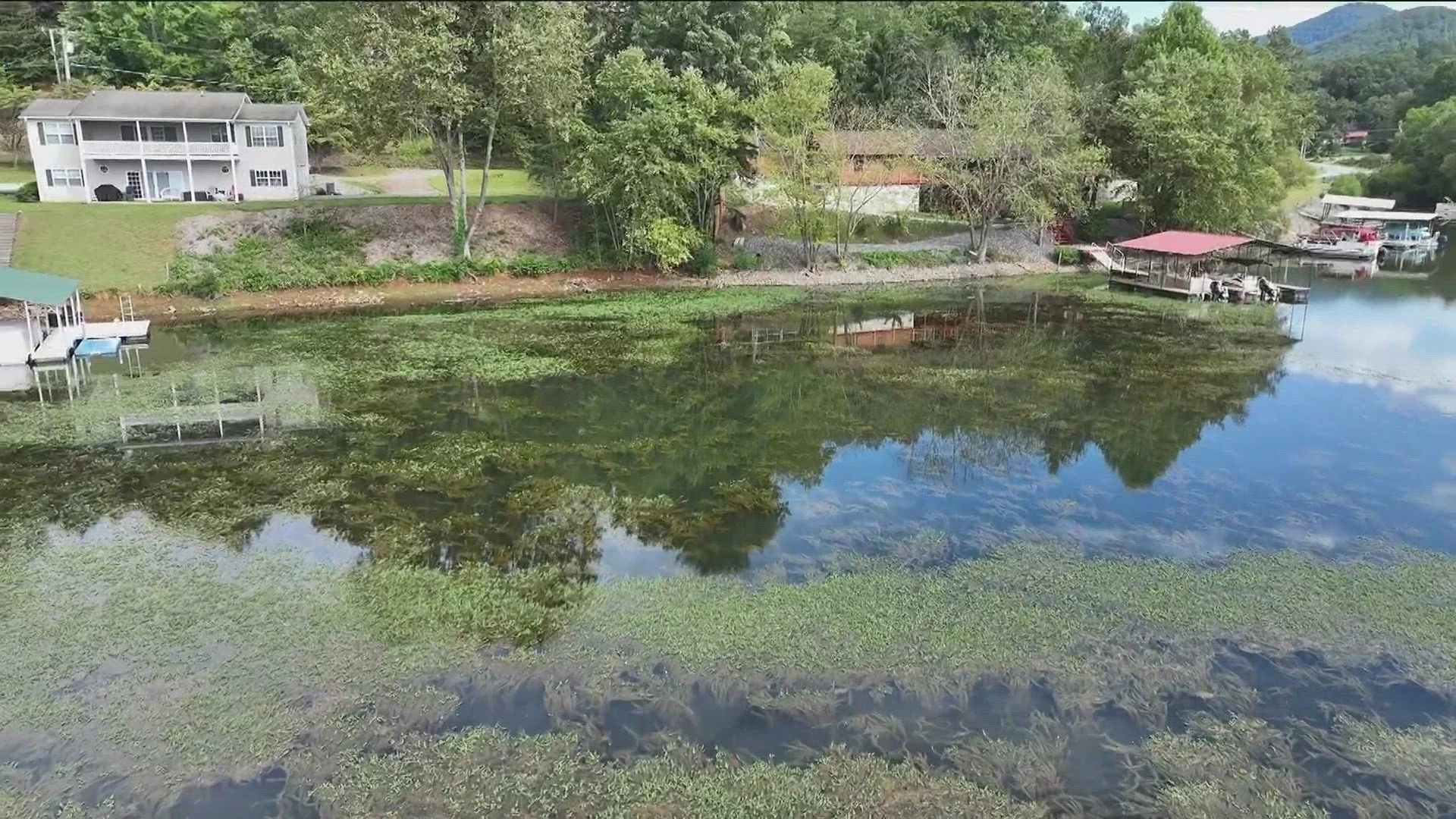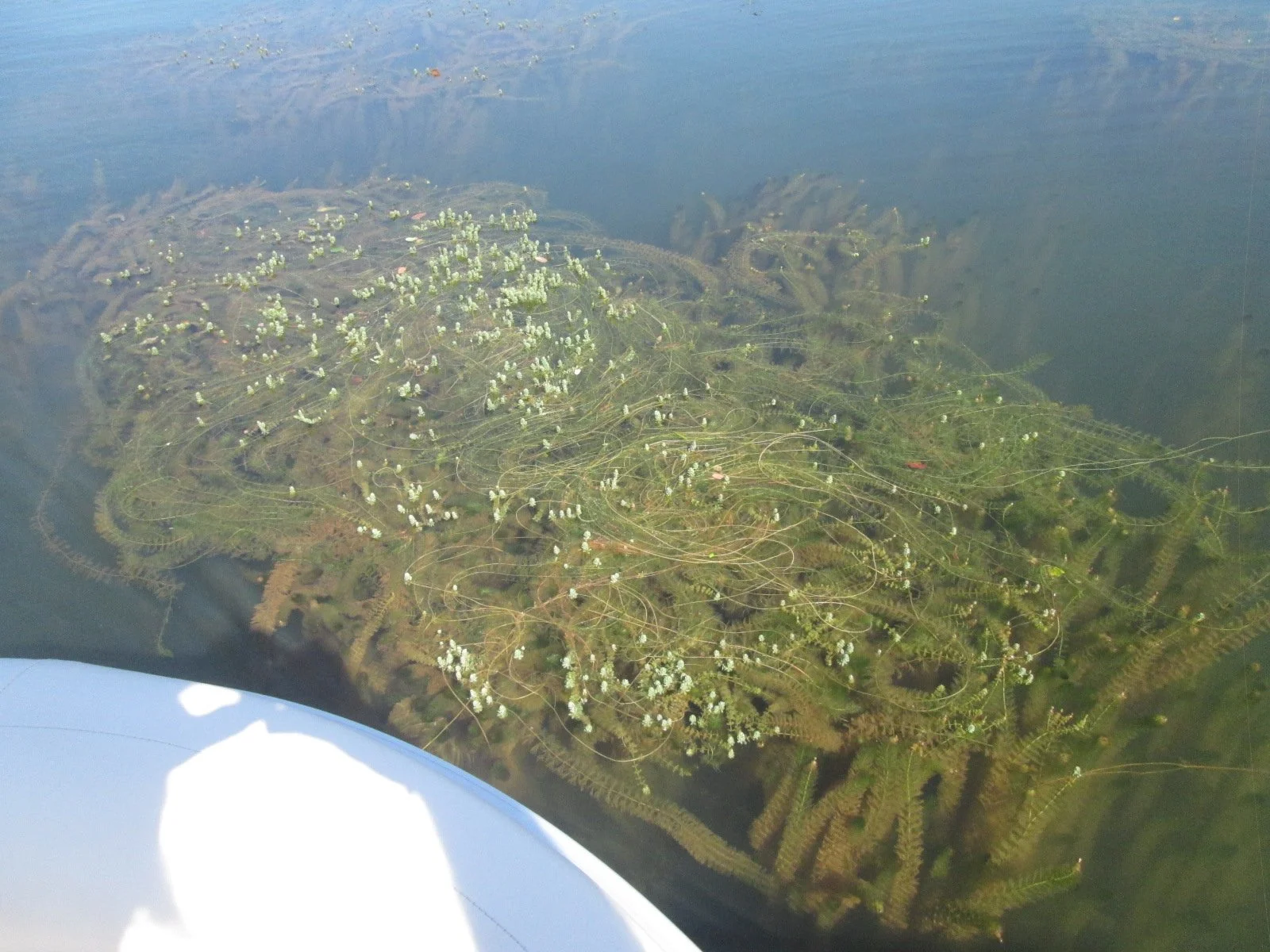
THE LAKE CHATUGE PARROT FEATHER PROJECT

Controlling Nuisance Aquatic Weeds in the Headwaters of Lake Chatuge
Pictured above: Parrot feather infestation in the south end of Lake Chatuge near the US Hwy. 76 bridge in Towns County, Georgia.
For the last two summers, noxious weeds have been an unwelcome presence on the south side of Lake Chatuge in and around the Macedonia area of Towns County, Georgia. The primary culprit, parrot feather (Myriophyllum aquaticum), is native to tropical parts of South America, Australia & New Zealand. Despite its highly invasive tendencies in natural waters, it is still actively promoted and sold for use in ponds and aquariums and has been accidentally introduced to waterways all over the US from these sources. Like many invasive aquatic species, parrot-feather can be transferred to new lakes on boats and other watercraft. Flourishing in warm water conditions, it grows rapidly in late spring and summer, creating huge mats of rooted vegetation that can cause recreational and navigational issues.
Photo: Parrot feather (Myriophyllum aquaticum), an invasive aquatic weed.
Chatuge Dam and Reservoir are owned and managed by the Tennessee Valley Authority. Earlier this year, TVA completed a thorough survey of aquatic plants in Lake Chatuge. As we know, they again found an infestation of invasive parrot feather in the headwaters of Lake Chatuge.
The agency is currently conducting an in-house environmental review to evaluate the use of grass carp and/or chemical control for managing the weeds. The study likely won’t be completed until summer 2024. If grass carp are found to be a useful control measure, the strategy will then need to be approved by Georgia Department of Natural Resources (DNR). If DNR approves the stocking, TVA will implement the stocking program and monitor the outcome.
However, due to a Tennessee Valley-wide scope of operations, TVA only provides chemical control of aquatic plants in “developed public-access areas like boat ramps, swim beaches, and courtesy piers on its reservoirs on an as-needed basis when recreational use and/or access become seriously hindered.” (Read more about TVA’s treatment of aquatic weeds here.) Since the infestation in Lake Chatuge doesn’t currently meet these parameters, if chemical control is the only recommended option, it will be up to homeowners, residential communities, and/or the county to control the infestation. The growing season is almost over this year, but MountainTrue is working in consultation with TVA to develop specific recommendations for homeowners and residential communities to control the parrot feather next year. We will host public information sessions early in the season and will have referrals for licensed applicators working in our area.
Attempting to control parrot feather by manual or mechanical methods is likely to spread the plants further and should only be conducted in small, contained water bodies, not in a large reservoir like Lake Chatuge. Even driving through parrot feather in a boat can break off small pieces, which can drift and take root in another location!
For homeowners and residential communities who don’t want to wait for the completed environmental review and possible grass carp stocking program – which may not even be implemented until late summer 2024 or later – TVA advises that commercial pesticide applicators with an Aquatics rating on their license can be hired to apply aquatic herbicides to control infestations around private docks and in small coves. When aquatic herbicides are applied according to their label by a licensed professional, they pose no threat to people, pets, fish, birds, or any other wildlife, short or long-term. In the case that there is a one-day swimming restriction or any other restriction, a licensed herbicide applicator will always communicate this to anyone with access to the water, as well as posting any relevant signs. The applicator will also know about the restrictions associated with distance to a public drinking water intake. While a complete listing of Georgia-licensed commercial applicators can be found here, keep in mind that there are several categories of applicators; not all of them have the Aquatics certification.
Neighboring Lake Burton in Rabun County has also had an infestation of parrot feather for several years. In a statement issued by Georgia Power in August 2020, these three companies were listed as “known firms successfully used by other members;” however, homeowners hiring one of these or another licensed commercial applicator are advised to always check references:
Southeast Consulting – https://www.scsforestry.com/
Solitude Lake Management – https://www.solitudelakemanagement.com/
AquaDoc – https://www.aquadocinc.com/
Homeowners should refrain from undertaking chemical control on their own using AQUACIDE pellets or similar products that were primarily developed for recreational ponds. Product information warns of this environmental hazard: “Treatment of dense weed areas can result in oxygen depletion due to decomposition of dead weeds. This oxygen loss can cause fish suffocation,” leading to fish kills.
Finally, it’s important to remember that there are native and beneficial aquatic plants in Lake Chatuge, which fish and other aquatic life rely on for food and cover from predators. Homeowners should work with professionals to be certain that they have a nonnative invasive plant before undertaking any management activities.
If you have questions, contact MountainTrue Western Region Program Coordinator Tony Ward at tony@mountaintrue.org or 828-837-5414 ext. 3.
Tips for controlling the spread of invasive plants:
Keep it Clean—Remove all plant material from boats, trailers, bilges, live wells, and any other equipment. This will prevent troublesome aquatic species from being introduced into other lakes.
Native Water Gardening Only—Please plant only native species around shorelines. While nonnative species like ornamental lilies and water hyacinth are beautiful, they will quickly spread if introduced into the river.
Drain and Dry—When visiting reservoirs with known invasive plants, make sure all equipment is dry and free from fragments. Even completely dry fragments have the potential to grow once submersed again.
No Dumping! —Please refrain from dumping unwanted aquarium or water garden plants into nearby streams and rivers. Dispose of any unwanted plants in the garbage.
Aqua Services Proposal Chosen for Control of Parrot Feather in Lake Chatuge
MountainTrue and Save Lake Chatuge are excited to announce that a proposal from Aqua Services has been selected for control of the invasive parrot feather in the southern end of Lake Chatuge this year. The company will utilize two airboats, both capable of surface and deep-water application, to apply the herbicide ProcellaCOR at the appropriate rate(s) and depths. Customized rates will be applied to surface and subsurface plants depending on density, biomass, and water depth. The company conducted detailed mapping of the plants on Monday, February 26, in anticipation of drafting a contract with MountainTrue. While invoices will be based on the actual amount of herbicide applied, the total cost of this year’s treatment, including MountainTrue’s 10% project management fee, is anticipated to be around $250,000 for initial area. This cost could increase if other parrot feather is found in other areas of the lake.
Pictured above: Map showing the 2024 season parrot feather management area at the southern end of Lake Chatuge in Towns County, GA.
The initial application will be performed when the water temperature is above 50 degrees Fahrenheit and the plants begin to put on new growth. While the timing will be based solely on when the Aqua Services professionals feel that the treatment will be most effective, we anticipate that it will occur end of April - begining of May. Four follow-up visits will occur at two-week intervals after the initial visit. During each follow-up, applicators will survey the treatment area to assess the effectiveness of the prior treatment and provide spot treatments as needed based on survey results. The company has also quoted a per-acre rate so that if unanticipated regrowth occurs later in the season (after the four follow-up visits), we know the price of additional visits.
ProcellaCOR was developed in 2010 and was subject to dozens of peer-reviewed scientific studies for several years, leading up to its ultimate approval by the US Environmental Protection Agency (USEPA) in 2017. The active ingredient of ProcellaCOR, florpyrauxifen-benzyl, has been utilized worldwide for many years as an herbicide on food crops such as rice. It is applied directly into the water at the depth of the invasive plants. It is a systemic herbicide, meaning that the plant takes in the chemical and distributes it through its entire structure and roots rather than only killing the leaves. The plant dies off over a period of two to four weeks and breaks down naturally. Since ProcellaCOR works slowly and there will be cool water at the time of the initial application, slow plant decomposition is expected with little to no effect on dissolved oxygen levels. ProcellaCOR itself is short-lived and breaks down naturally and quickly, within three to four days.
According to the USEPA ProcellaCOR Pesticide Product Label, there are no restrictions for recreational purposes, including swimming and fishing, or for watering grass. The only restrictions for use of the treated water are for residential landscape plants and homeowner gardens. Almost all hazards described in the label are for the people who handle and apply the herbicide.
Before selecting Aqua Services, MountainTrue and a team of five people from Save Lake Chatuge reviewed proposals and credentials from five companies. We researched various potential methods of control, as well as several different herbicides, even going so far as to contact the manufacturers of the herbicides to speak with them about our specific project. Many of the research papers we found, as well as the species profile of parrot feather on the Great Lakes Aquatic Nonindigenous Species Information System website, were written in whole or in part by Ryan M. Wersal, Ph.D., who is an Associate Professor of Aquatic Weed Science at Minnesota State University, Mankato. Dr. Wersal did his doctoral thesis on parrot feather and is one of the world’s foremost experts on its treatment and control. We asked if he would help us decide on a treatment plan, and he agreed! After much exchange of information via email and phone, our group met with him virtually, and he recommended using the Auxin family of herbicides for treatment over all other potential methods and chemicals. ProcellaCOR was chosen because of its low use rate compared to the other auxin herbicides and because Aqua Services has used it with great success on other parrot feather infestations.
While other companies also proposed using ProcellaCOR as a primary method of treatment, Aqua Services, based in Guntersville, AL, has been in operation in the south for more than 40 years, holds contracts with TVA for aquatic weed management, and quoted the lowest price for our project. Click here to read more about Aqua Services.
Complete control of the parrot feather infestation will take more than one year, but next year, we’ll have much less to treat, and there may be a period of years after that when no treatment is needed. MountainTrue will maintain the monies in the Parrot Feather Treatment Fund in perpetuity for the control of invasive aquatic weeds in Lake Chatuge.
The TVA manages Lake Chatuge, what is their position?
The following correspondence was received when a concerned citizen reached out, it outlines their current plan pretty clearly.
“Thank you for your email regarding the Parrot Feather on Chatuge Reservoir. TVA is aware of the occurrence of Parrot Feather on the reservoir and were scheduled to conduct an aquatic plant survey of the entire reservoir to document the location and size of any occurrence of submersed aquatic plants on the reservoir this week. Unfortunately the lead aquatic plant biologist had a death in the family and was unable to conduct the survey this week. TVA will be looking at reschedule the survey in the next couple of weeks. Once the survey is completed TVA will have to conduct an environmental study in order to follow the required NEPA (National Environmental Policy Act) process for the use of approved aquatic herbicides in the reservoir to address the issue as needed. We will also have to obtain permits from the State of Georgia and Tennessee.
If TVA receives clearance to make the treatments from the NEPA process and receives the necessary State permits, it will be in the spring or early summer of 2024 before any treatments are conducted. We will also follow a notification process to notify the public of TVA’s intentions to conduct aquatic plant management activities on the reservoir.
Regarding the concern to potable water treatment plants, the aquatic herbicide have a certain distance from the intake that we can’t treat within on certain aquatic herbicides and then there are certain aquatic herbicides are approve to go over the intake. We always coordinate any treatment that’s close to an intake with the water utility to ensure their in agreement with our treatment plan related to the intake.
Also, the draw down on the reservoir was not conducted to manage aquatic plant growth, it was drawn down to winter pool for flood protection.”
David G. Brewster
Manager, Natural Resources Management – West Operations
W. 256-891-6608 M. 256-505-9899 E. dgbrewster@tva.gov
What is the TVA?
The Tennessee Valley Authority provides electricity for 153 local power companies serving 10 million people in Tennessee and parts of six surrounding states, as well as directly to 58 large industrial customers and federal installations. We don't get taxpayer funding; rather, our revenues come from sales of electricity. TVA also provides flood control, navigation, and land management for the Tennessee River system and assists local power companies and regional governments with their economic development efforts.
Learn more at TVA.com
Jeff J Lyash, President & CEO
Jeff Lyash is president and chief executive officer of the Tennessee Valley Authority. Appointed by the Board of Directors in February 2019, Lyash leads the nation’s largest public utility in its mission of service to the people of the Tennessee Valley region.
He is also chairman of the Nuclear Energy Institute executive committee, providing oversight to NEI on policy affairs on behalf of the U.S. nuclear industry.
Lyash is as comfortable talking with a crew in a plant as he is in the boardroom. His exceptional people skills and technical experience make him one of the top leaders in the energy industry.
Before taking the helm at TVA, Lyash served as president and CEO of Ontario Power Generation Inc., one of the largest electric generating companies in Canada with a diverse fleet of nuclear, hydroelectric, gas, biomass, and renewable generating stations.
Lyash was formerly the president of CB&I Power, where he was responsible for a full range of engineering, procurement, and construction of multi-billion-dollar electric generation projects in both domestic and international markets. He also provided operating plant services for nuclear, coal, gas, oil, and renewable generation.
Prior to joining CB&I, Lyash served as executive vice president of Energy Supply for Duke Energy, where he led engineering, maintenance, and operations of the company's 42,000-megawatt generation fleet, fuel procurement, power trading, major projects and construction, environmental programs, and health and safety programs.
Before the merger of Progress Energy and Duke Energy, Lyash was executive vice president of Energy Supply for Progress Energy. In this role, he oversaw Progress Energy's diverse 22,000-megawatt fleet of generating resources, including nuclear, coal, oil, natural gas, and hydroelectric stations. In addition, Lyash was responsible for generating fleet fuel procurement and power trading operations.
Lyash joined Progress Energy in 1993, serving as executive vice president of corporate development, president and chief executive officer of Progress Energy Florida, senior vice president of Energy Delivery Florida, and vice president of Transmission.
Lyash began his career in the utility industry in 1981 and worked for the U.S. Nuclear Regulatory Commission in senior technical and management positions throughout the Northeast and in Washington, D.C. He received the NRC Meritorious Service Award in 1987.
Lyash earned a bachelor's degree in mechanical engineering from Drexel University and was honored with the Drexel University Distinguished Alumnus Award in 2009. He has held a senior reactor operator license from the Nuclear Regulatory Commission and is a graduate of the U.S. Office of Personnel Management Executive Training Program and the Duke Fuqua School of Business Advanced Management Program.
Lyash is an avid golfer and fly fisherman. He and his wife, Tracy, enjoy cooking, skiing, reading, and charitable work – and spending time with their two married children and nine grandchildren. The Lyashes live in Knoxville, Tennessee.
TVA BOARD OF DIRECTORS
Board members are nominated by the President of the United States and confirmed by the Senate, and each serves a term of five years. The proceedings of Board meetings are open to the public. When their terms expire, directors may remain on the board until the end of the current congressional session (typically in December) or until their successors take office, whichever comes first.
Chair - Joe Ritch of Huntsville, Alabama, practices law with the firm of Dentons Sirote, PC, in Huntsville. He also serves as chairman of the Redstone Regional Alliance and remains active in the community. He has received numerous business and community awards and was inducted into the Alabama Business Hall of Fame in 2021. A previous TVA Board Chair, his term expires on May 18, 2025.
Beth Geer of Brentwood, Tennessee, serves as the chief of staff for former Vice President Al Gore and participated in the Nashville Sustainability Advisory Committee. She applied her policy experience in climate change and environmental justice to previous positions in the Clinton-Gore White House, the U.S. Department of Labor, and the U.S. Senate. Her term expires on May 18, 2026.
Beth Harwell of Nashville, Tennessee, was the speaker of the Tennessee House of Representatives for seven years while serving as the 56th District state representative for nearly 30 years. Previously, she chaired the Tennessee Republican Party and served as an assistant professor of political science at Belmont University, as well as in a variety of additional roles in both education and public service. Her term expires on May 18, 2024.
Bill Kilbride of Chattanooga, Tennessee, served as President/CEO of the Chattanooga Area Chamber of Commerce from 2014 to 2017. Previously, he served as president of the Home Division and Chief Sustainability Officer for Mohawk Industries in Calhoun, Georgia, for more than 20 years. He currently serves on the board of several nonprofit and for-profit Chattanooga-based organizations. His term expires on May 18, 2023.
Bobby Klein of Chattanooga, Tennessee, served as a vice president of the International Brotherhood of Electrical Workers after a decades-long career as a lineman and foreman with the Electric Power Board of Chattanooga. He also served 14 years as president of the Tennessee Valley Trades and Labor Council, as well as on the TVA Labor-Management Committee. His term expires on May 18, 2026.
Michelle Moore of Midlothian, Virginia, is the author of “Rural Renaissance” and CEO of Groundswell, a nonprofit that builds community power to reduce energy burdens and expand economic opportunity. From her roots in rural Georgia, Michelle has worked to connect clean energy with affordability and quality of life for more than 25 years, including leading federal sustainability and infrastructure project delivery for the Obama White House. Her term expires on May 18, 2026.
Brian Noland of Johnson City, Tennessee, joined East Tennessee State University as its ninth president in 2012 after previously serving as the chancellor of the West Virginia Higher Education System. In 2018, he was elected to the board of the American Council on Education and also serves on the boards of a number of other educational and civic organizations, as well as an Institute of Higher Education fellow at the University of Georgia. His term expires on May 18, 2024.
Bill Renick of Ashland, Mississippi, is the chair of the Commission on the Future of Northeast Mississippi and previously served 13 years as the Workforce Division Director at Three Rivers Planning and Development District. A longtime public servant, Renick has served in multiple local and state elected and appointed positions. His term expires on May 18, 2027.
Wade White of Eddyville, Kentucky, completed his 12th year as Lyon County Judge Executive and is now employed with Farmers Bank and Trust Co. of Princeton and Eddyville in business development and public relations. He is the recipient of multiple awards. An avid supporter of recreational fishing, he led initial efforts to raise awareness about the invasive Asian carp species that threatens the Tennessee and Cumberland rivers and was inducted into the Freshwater Fishing Hall of Fame in 2016. His term expires on May 18, 2027.
The Department of Natural Resources has statewide responsibilities for the management and conservation of Georgia’s natural and cultural resources. Most of this work is conducted by DNR’s five operating divisions that have statutory authority over the management and protection of Georgia’s natural and cultural resources. The Divisions also provide technical assistance, education and outreach and other programming relevant to their individual missions.
Below is an informative conversation that we’ve had with our local Georgia DNR officials.
“I have not personally observed parrotfeather at Beech Cove, but it is very likely present. Chemical treatment with aquatic herbicides is the best method for controlling parrotfeather, but it will only knock it back and not eradicate it completely. Lake Seed and Lake Rabun have dense stands of parrotfeather. Georgia Power Company sprays herbicides occasionally to help keep the river channel open for boaters.”
“…DNR is aware of the parrotfeather infestation in Lake Chatuge, tracked its rapid spread over the last two years, and reported our findings to TVA. Those actions are the limits of our responsibility. Nuisance aquatic plant control on Lake Chatuge is the responsibility of TVA, so we continue to ask lake residents/users to direct their concerns to TVA. If I can answer your questions about parrotfeather, its ecological impacts, and potential control measures, feel free to call me at (770) 535-5498.”
— Anthony Rabern, Region 2 Supervisor, Fisheries
FAQ
How much will it cost?
We’re still negotiating with vendors, but the cost for 2024 is expected to be about $250,000.
Will that effectively eradicate the Parrot Feather?
We believe this treatment will allow us to have a successful, fun-filled 2024 on the lake. Research says that Parrot Feather is difficult to completely eradicate, and maintenance will be required in future years, but that treatment in future years will be less expensive.
What if we do nothing?
Parrot Feather spreads quickly. In 2022 it was a nuisance in the southern part of the lake. By late summer 2023 residents and guests couldn’t swim in the water and couldn’t take their boats out. If we do nothing, expect it to spread to the entire lake, in any area where water depth is 15 feet or less. It’s not if, it’s when.
Why isn’t TVA paying for this?
TVA has stated that they are doing a study which will be completed in summer 2024, and that in any event they would only treat public areas such as boat ramps and beaches. Even if TVA did accept responsibility and agree to pay for treatment, it would be too late for us.
Why isn’t Towns County paying for this?
A: County Commissioner Cliff Bradshaw has said the county realizes something needs to be done, or the economy will suffer. But the County Attorney has told Commissioner Bradshaw that it would be illegal to use public funds for a private problem. He’s also said that this does not qualify as a County Emergency, which would allow the use of emergency funds.
Update: On January 30, Commissioner Bradshaw called a special County meeting, where he announced that Towns County will donate $100,000 to the cause, using the County portion of hotel-motel tax proceeds.
Does that mean we will be fundraising for Parrot Feather treatment every year?
It is our HOPE that county and state funding can be approved and budgeted for subsequent years. For 2024, we don’t feel like we can sit around and wait, which is why we need to act now.
Is my donation tax deductible?
Yes. Our partner in this process is Mountain True, a 501c3 non-profit organization whose mission is to “Champion resilient forests, clean waters, and healthy communities in the Southern Blue Ridge.”
How do I donate?
There is a donate button on savelakechatuge.org and a QR code on FB group that links directly to the Mountain True Lake Chatuge PF project. You can also mail a check to Mountain True, 29 N Market St, Ste 610, Asheville NC 28801-designate Lake Chatuge PF project in memo line. (IMPORTANT: to ensure your online donation is applied to this project – use donate button on website page or through the QR code).
What happens if we don’t raise enough money to pay for treatments in 2024? Can I get my money back?
A: We are very encouraged by our fundraising success to date. But if we were unable to raise enough funds, yes, donors can request a refund at any point up until Mountain True signs a contract with the selected vendor, which is expected to be early March. We will post a running total of funds raised on our website Savelakechatuge.org, and our Facebook group, with the total funds raised updated at least weekly.
I’ve talked to some folks who say they’re going to sit back and wait to see how things go before they donate. Should I do that too?
That’s a strategy, but we’d ask you not to wait. If everyone sits back and waits, then nothing ever happens! Not just as it relates to Parrot Feather, but as it relates to everything in our lives. As Margaret Mead said, “Never doubt that a small group of thoughtful, committed citizens can change the world. Indeed, it is the only thing that ever has.” Let’s Save Lake Chatuge, together.
Q: Who is controlling the donation money?
A: We have partnered with Mountain True West to handle donations, manage treatment payments, etc. They are a 501c3 non-profit and have been in operation for 40 years. Towns County has contracted with Mountain True to monitor water quality for a number of years.
Can't the weeds be mechanically removed?
Attempting to control parrot feather by manual or mechanical methods is likely to spread the plants further and should only be conducted in small, contained water bodies, not in a large reservoir like Lake Chatuge. Even driving through parrot feather in a boat can break off small pieces, which can drift and take root in another location!
Wouldn't it be better to just drain the lake and let the parrot feather die?
Research shows that parrot feather roots can remain alive in the soil for up to 6 months with even the slightest bit of moisture. As a result, if the lake was drained, even for 6 months, the parrot feather would just come right back once the lake was filled again. Also, Lake Chatuge is fed by an impoundment of the Hiwassee River. The river channel could still harbor parrot feather even if the lake was drained. This is not a feasible option, particularly when you consider TVA's overall reservoir operations.
Are these herbicides used to kill parrot feather going to poison our water supply?
The following is a portion of a recent letter from MountainTrue to a concerned citizen: We understand people's concerns about herbicides being used in Lake Chatuge where water is withdrawn, treated and distributed as a public drinking water supply. MountainTrue is an environmental organization and if there was any other way to control the parrot feather, we would absolutely be doing that.
Firstly, your drinking water will not be contaminated. MountainTrue has had long conversations with aquatic weed experts at TVA. These people use herbicides to treat lakes with public drinking water supply intakes all over the region. Before the chemicals are applied in the vicinity of the intake, the water plant staff fill their reserve tanks and turn the intake off. After a period of hours - the amount of time is determined by many factors including the volume of water near the intake, the volume of herbicide applied, and the type of herbicide applied - they turn the intake back on and they monitor to be sure no herbicide is coming in. This routinely happens on other reservoirs and the weeds are controlled with no negative impact on the water supply.
Second, if we all come together and treat the whole infected area now, it will greatly diminish the amount of herbicide that will be routinely applied in future years and we'll know exactly what's being applied, when and where. Keep in mind that it is perfectly legal for individual property owners to hire companies to treat the weeds with herbicide right now with no permit required. I have no doubt that some landowners already applied herbicides this past summer. So, chemicals have already likely been applied to your drinking water lake. Again, no permits are required. If MountainTrue is not managing the treatment, no one will know what's being applied, when, by these companies at individual properties, including the water plant operators!
And last, but definitely not least, there are some terrible products out there that people can just buy and put in the lake! There is no way to police people going and buying horrible Aquacide pellets and just tossing them into the lake. There's no guarantee that they will even hire a certified commercial applicator. They may just take matters into their own hands. This is the main reason why MountainTrue is involved. I think if they have some level of confidence in MountainTrue and the team to take care of this problem, there is less likelihood of them "going rogue" and doing something that could kill fish and truly contaminate the water supply.









